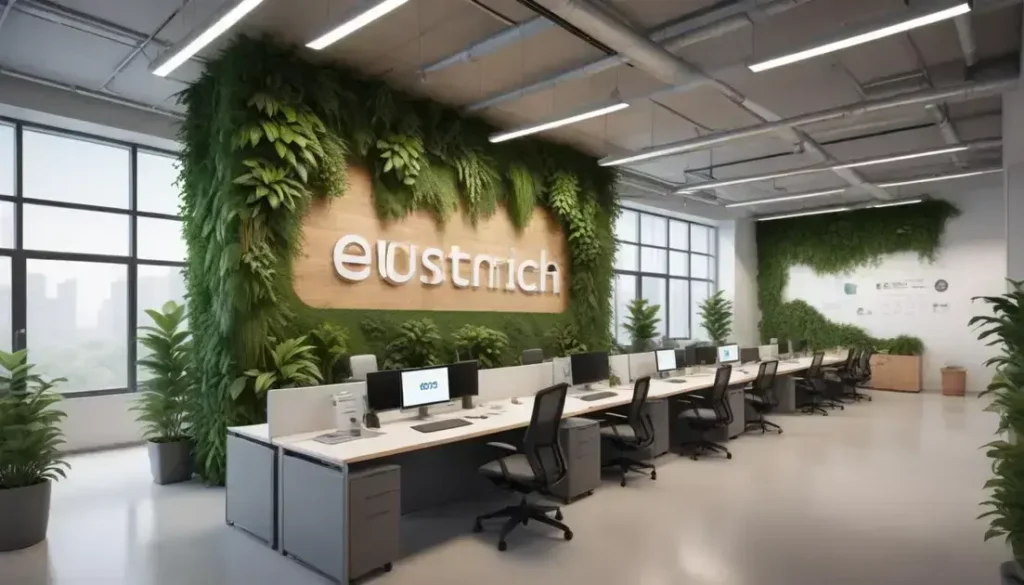The UK’s Industrial Strategy focuses on sustainable growth by investing in clean energy, advanced manufacturing, and workforce development to enhance productivity while achieving net-zero emissions by 2050.
The UK’s new industrial strategy aims to reshape the landscape of manufacturing while enhancing sustainability efforts. What does this mean for British businesses?
Overview of the UK’s Industrial Strategy
A key focus of the UK’s Industrial Strategy is to enhance sustainability across various sectors. By prioritising investment in clean energy and resource-efficient technologies, the strategy aims to boost productivity while minimising environmental impact.
One significant component is the commitment to clean growth, which involves transitioning towards low-carbon energy sources. This transition not only supports climate goals but also creates opportunities for innovation within the energy sector. By investing in renewable energy, the UK is positioned to lead in this rapidly evolving market.
Moreover, the strategy promotes the integration of digital technologies into traditional industries. This integration prepares manufacturers for the future by enhancing operational efficiency and fostering new business models. For example, adopting smart technologies can streamline production processes, ultimately reducing costs.
Investment plans also include initiatives aimed at boosting skills within the workforce, ensuring that employees are well-equipped to handle new technologies. This focus on upskilling is vital for maintaining the UK’s competitive edge in a global market.
In essence, the UK’s Industrial Strategy is designed to foster an environment where businesses can thrive while ensuring a sustainable future. This dual focus is paramount for addressing both current economic challenges and long-term goals.
Key investments in energy and infrastructure
The UK’s Industrial Strategy places a strong emphasis on key investments in energy and infrastructure. These investments are critical to ensuring a sustainable future while enhancing economic growth. By directing funds into renewable energy sources, the UK aims to reduce dependency on fossil fuels and improve energy efficiency.
A prominent focus is on offshore wind farms, which are set to provide substantial energy outputs. The government plans to expand these initiatives, creating thousands of jobs and bolstering the economy. Moreover, investment in solar energy technologies is also being prioritised, with advancements aimed at making solar installations more efficient and accessible.
Infrastructure improvements are equally vital. Upgrading national grids and transportation systems will facilitate better connectivity and reliable energy distribution. Investments in electric vehicle (EV) infrastructure, such as charging stations, are designed to support the growing market for EVs and reduce carbon emissions.
Collaboration with private sectors is fundamental for these initiatives. By engaging with businesses and stakeholders, the UK government aims to foster innovation and attract further investment. This collaborative approach ensures that the strategies prepared align effectively with market demands and sustainability goals.
Impact on electricity costs for manufacturers
The impact of electricity costs on manufacturers is a significant concern as the UK transitions towards a more sustainable energy landscape. As investments in renewable energy sources increase, manufacturers must adapt to potentially fluctuating energy prices. Understanding these dynamics is crucial for maintaining profitability in the highly competitive market.
Renewable energy initiatives may lead to long-term reductions in energy costs, as sunlight and wind become more widely harnessed. However, the transition period can result in volatility in electricity prices. Manufacturers may face higher costs temporarily during the upgrade of infrastructure needed to accommodate these new energy sources.
The implementation of energy efficiency measures can mitigate some of these impacts. By investing in smart technologies and energy-efficient processes, manufacturers can decrease their overall energy consumption, protecting themselves against sudden price hikes. This proactive approach not only reduces expenses but also enhances sustainability.
Furthermore, government support and incentives aimed at encouraging energy-efficient practices can significantly influence costs for manufacturers. Engaging with these initiatives allows companies to adopt best practices while ensuring compliance with emerging regulations.
Overall, the future of electricity costs for manufacturers will hinge on successful integration of renewable energy and energy efficiency measures, ultimately defining the landscape of manufacturing in the UK.
Strategies for sustainable growth
Strategies for sustainable growth are essential for manufacturers seeking to thrive amidst changing economic conditions. Emphasising efficiency and innovation, these strategies are designed to reduce environmental impact while increasing profitability.
One effective approach is the adoption of circular economy principles. By rethinking product life cycles, manufacturers can minimise waste and optimise resource use. This involves designing products that can be easily recycled or repurposed, which not only conserves materials but also opens new revenue streams.
Investing in green technologies is another significant strategy. Innovations such as energy-efficient machinery and waste reduction systems can drastically lower production costs. By leveraging advancements in technology, businesses can improve their operational efficiency while adhering to sustainability goals.
Collaboration with stakeholders is vital to align efforts towards sustainability. Manufacturers should work together with suppliers, customers, and local communities to develop shared sustainability goals. This collaborative approach can lead to enhanced innovation and shared resources, creating a stronger, more resilient supply chain.
Lastly, engaging in ongoing employee training on sustainability practices fosters a culture of responsibility. When staff are informed and motivated to implement sustainable actions, it leads to not only compliance but enhanced performance across the board. Thus, sustainable growth becomes a shared vision throughout the organisation.
Supporting high-energy sectors
Supporting high-energy sectors is integral to the UK’s Industrial Strategy, particularly as industries such as manufacturing and construction navigate the transition to renewable energy. These sectors often rely on substantial electricity usage, thus, tailored support is crucial for their sustainability and growth.
The UK government aims to assist these sectors through targeted investments in energy efficiency technologies. By adopting advanced technologies, such as smart grids and energy management systems, companies can optimise their energy consumption and reduce costs effectively. Enhanced energy efficiency not only lowers bills but also contributes to broader environmental goals.
In addition, financial incentives and support programmes are being launched to help industries transition to cleaner energy sources. The move towards electricity from renewable resources will facilitate reduction in carbon emissions while meeting energy demands. Furthermore, collaboration with energy suppliers can lead to bespoke tariffs that benefit high-energy users, ensuring their competitiveness.
Educational initiatives play a critical role in this support. By equipping workers with the knowledge and skills to implement energy-efficient practices, the workforce is empowered to innovate within their sectors. This approach fosters a culture of sustainability while enhancing operational standards.
Ultimately, by prioritising support for high-energy sectors, the UK can secure a robust, sustainable industrial landscape that aligns with its climate objectives.
Investment in advanced manufacturing
Investment in advanced manufacturing is pivotal for enhancing the UK’s industrial capacity and competitiveness. This sector focuses on using cutting-edge technologies to improve production processes and deliver high-quality products. By embracing advancements such as robotics, automation, and artificial intelligence, manufacturers can significantly boost efficiency and reduce production costs.
Funding for research and development in advanced materials and innovative processes is crucial. This investment enables firms to remain at the forefront of technology, allowing them to develop products that meet evolving customer demands. The use of smart manufacturing techniques, including data analytics, helps in making informed decisions that optimise operations.
Moreover, the integration of sustainable practices into advanced manufacturing processes is becoming increasingly important. By investing in environmentally friendly technologies, manufacturers can reduce waste and emissions while adhering to stringent regulatory standards. This alignment with sustainability not only addresses regulatory pressures but also appeals to environmentally conscious consumers.
Collaboration with academia and research institutions enhances innovation and knowledge transfer, further strengthening this sector. By fostering partnerships, manufacturers can access new findings and technologies that drive further advancements in production.
Ultimately, strategic investment in advanced manufacturing is essential for the UK to secure a robust, competitive edge in the global market, ensuring long-term economic growth.
Role of clean energy initiatives
The role of clean energy initiatives is pivotal in reshaping the UK’s industrial landscape, particularly in response to climate change and energy security challenges. These initiatives focus on reducing greenhouse gas emissions while promoting sustainable energy sources. In doing so, they aim to create a more resilient and environmentally friendly economy.
Investments in renewable energy technologies such as wind, solar, and hydroelectric power are at the forefront of these initiatives. By diversifying energy sources, the UK can lessen its dependence on fossil fuels and enhance energy security. This transition not only mitigates environmental impact but also fosters job creation within the green economy.
Moreover, government policies are crucial in driving the adoption of clean energy solutions. Through incentives and regulations, the government encourages industries to invest in cleaner technologies. These policies often support research and development, paving the way for innovative solutions that can be applied across various sectors.
Additionally, public awareness and community engagement play important roles in the success of clean energy initiatives. As communities become more informed about the benefits of renewable energy, grassroots movements emerge, pushing for greater adoption and support of clean technologies.
Ultimately, the integration of clean energy initiatives is essential for achieving the UK’s environmental targets and creating a sustainable future.
Digital technologies and innovation
Digital technologies and innovation are transforming the manufacturing landscape in the UK. Embracing these advancements is essential for companies aiming to enhance productivity and remain competitive in a global market. Innovations such as Internet of Things (IoT), artificial intelligence (AI), and big data analytics are redefining how industries operate.
Companies can utilise IoT to connect machinery and collect real-time data, enabling better decision-making and predictive maintenance. This integration increases operational efficiency, as businesses can anticipate issues before they escalate into costly breakdowns.
Artificial intelligence plays a crucial role in automating processes and optimising workflows. By analysing vast amounts of data, AI provides insights that help identify trends and streamline operations. This enhances not only productivity but also the quality of products and services.
Moreover, the use of cloud computing facilitates collaboration and data sharing across different teams and locations. This enables manufacturers to innovate faster and respond swiftly to market changes. By leveraging digital technologies, businesses can enhance their agility and adaptability.
Investing in innovation also fosters a culture of continuous improvement. Encouraging employees to engage with new technologies promotes a proactive approach toward problem-solving and drives the overall performance of the organisation.
Training and workforce development
Training and workforce development are essential components of the UK’s Industrial Strategy, particularly as industries navigate a rapidly changing technological landscape. Investing in the skills of the workforce ensures that employees are equipped to handle new technologies and methodologies that improve productivity and efficiency.
Companies are increasingly recognising the need for ongoing professional development. This includes training programmes that focus on technical skills, such as operating advanced machinery and using digital tools. By enhancing these skills, firms can foster a more competent workforce that can adapt to evolving market demands.
Mentorship and apprenticeships play a crucial role in workforce development as well. These programs provide hands-on experience and create pathways for young talent to enter the industry. Engaging with educational institutions helps align curricula with industry needs, ensuring that graduates are job-ready.
Moreover, fostering a culture of lifelong learning encourages employees to continuously seek out training opportunities. This approach not only enhances individual career prospects but also drives overall organisational performance. As companies invest in their workforce, they build a more resilient and innovative organisation capable of thriving in the competitive landscape.
Ultimately, prioritising training and workforce development is vital for achieving sustainable growth and maintaining a competitive edge in the evolving market.
Infrastructure improvements and planning
Infrastructure improvements and planning are critical elements in supporting the UK’s Industrial Strategy. A focus on enhancing infrastructure ensures that industries can operate efficiently and sustainably. Investments in transportation networks, energy systems, and digital communication are essential to facilitate the growth of businesses across various sectors.
Upgrading transportation infrastructure improves connectivity between cities, ports, and manufacturing hubs. Better roads, rail systems, and ports enhance logistical capabilities, allowing companies to streamline their supply chains. This efficiency reduces costs and increases competitiveness within the global market.
In addition, improvements in energy infrastructure are necessary to support the shift to renewable energy sources. Developing advanced grids that can integrate renewable energy production ensures a reliable power supply for manufacturers while reducing carbon emissions. This infrastructure supports sustainability goals in line with government targets.
Moreover, investing in digital infrastructure enhances connectivity for businesses. Fast and reliable internet access enables manufacturers to adopt advanced technologies, such as IoT and smart manufacturing practices. This connectivity fosters innovation and collaboration across industries.
Effective planning is also crucial in aligning infrastructure development with community needs and environmental sustainability. Engaging stakeholders in the planning process ensures that new projects meet both economic and social objectives, thus promoting long-term growth.
Long-term vision and goals
A long-term vision and goals are essential for ensuring the sustainability and success of the UK’s Industrial Strategy. By establishing clear objectives, businesses can align their operations with national priorities, enhancing economic resilience and competitiveness. This strategic approach allows industries to adapt to changing market dynamics while contributing to societal needs.
One key aspect of this vision is the commitment to achieving net-zero emissions by 2050. This ambitious target drives industries to innovate and adopt cleaner technologies. Transitioning to a low-carbon economy helps combat climate change and ensures long-term sustainability of resources.
Moreover, fostering inclusive growth is another vital goal. The UK’s Industrial Strategy aims to create opportunities for all regions and communities. By investing in training and development, businesses can equip their workforce with the skills necessary for the future. This approach not only supports economic growth but also addresses social inequalities.
Planning for a resilient supply chain is also critical within this long-term vision. Strengthening supply chains enhances the UK’s ability to respond to disruptions, such as those experienced during the COVID-19 pandemic. Building local capacities and diversifying sources of supply helps mitigate risks and fosters economic stability.
Ultimately, a cohesive long-term vision and clear goals empower the UK to navigate challenges, innovate, and secure its position as a global leader in sustainable industry.
In Conclusion
The UK’s Industrial Strategy aims to create a robust and sustainable economy by investing in key areas such as clean energy, advanced manufacturing, and workforce development. These initiatives ensure that industries can adapt to changing market conditions while contributing to environmental and social goals.
By focusing on long-term visions and measurable objectives, businesses can work together with the government to build a stronger economy. Emphasising innovation and sustainability prepares the UK for future challenges and opportunities.
As industries embrace these strategies, they not only improve their competitiveness but also support a greener and more inclusive society. By investing in the future today, the UK can lead the way in creating a prosperous and sustainable tomorrow.
Frequently Asked Questions
What are the key goals of the UK’s Industrial Strategy?
The key goals include achieving net-zero emissions by 2050, fostering inclusive growth, and building a resilient supply chain to enhance economic stability.
How does investing in clean energy impact manufacturers?
Investing in clean energy allows manufacturers to reduce their reliance on fossil fuels, lower operational costs, and meet regulatory standards while promoting sustainability.
What role does workforce development play in industrial growth?
Workforce development ensures that employees acquire the necessary skills for new technologies, thereby boosting productivity and innovation within the industry.
Why is digital infrastructure important for manufacturers?
Digital infrastructure enhances connectivity and access to advanced technologies, which improves operational efficiency and fosters innovation in manufacturing processes.
How can businesses contribute to sustainability goals?
Businesses can adopt cleaner technologies, reduce waste, invest in renewable energy, and engage in community initiatives to support overall sustainability efforts.
What is the significance of infrastructure improvements for the economy?
Infrastructure improvements enhance transportation and communication, facilitating better logistics, supporting economic growth, and ensuring the smooth operation of industries.


